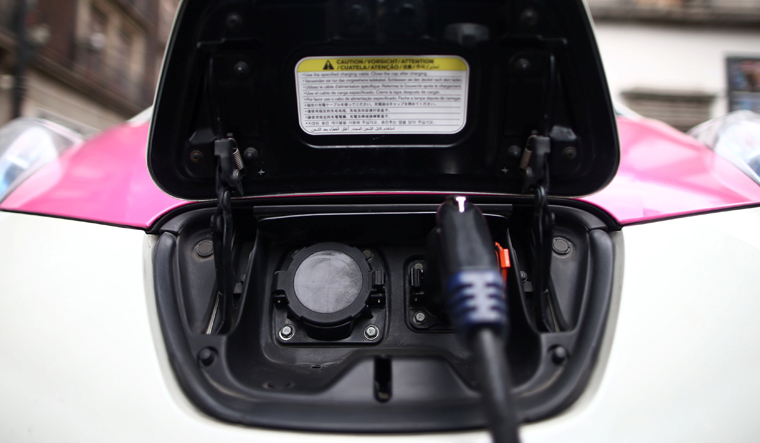All the goodies in Finance Minister Nirmala Sitharaman's red cloth bundle for the mobility sector, as it turned out, were reserved for the new kid on the block—the EV or electric vehicle segment. Already spluttering on a descending highway of decline, the conventional auto industry in the country can only seethe at this latest heartburn.
ALSO READ
- Corporate tax for large firms to be gradually cut to 25%: Sitharaman
- Govt may exempt foreign portfolio investors from higher taxes: Report
- OPINION: It's a pension scheme, for God's sake!
- Parliament approves Modi govt's FY20 budget
- Govt to go on disinvestment overdrive this year to raise capital
- 'Govt committed to fiscal consolidation sans compromise on public expenditure'
- India likely to raise funds from interest-soft overseas markets
- Govt working to resolve startups's legacy tax issues: CBDT chief
Connectivity is the lifeblood of our economy, declared Sitharaman, as she started off on her maiden budget speech on Friday. However, it was soon obvious that it would be electric charge, not an internal combustion engine (ICE) running on petrol or diesel, that Modinomics would prefer to power this connectivity. Going forward on last week's GST council recommendation to cut rates on EVs from 12 to 5 per cent, the minister sprang more surprises for the EV industry—buyers taking loans to buy electric vehicles will now get an income tax deduction of 1.5 lakh rupees on interest paid. “This amounts to a benefit of around 2.5 lakh rupees over the loan period to the taxpayer,” the finance minister pointed out.
There's more. Phase II of the FAME (Faster Adoption & Manufacture of Electric Vehicles) scheme, already cleared by cabinet in April, has an outlay of Rs 10,000 crore to give away as subsidy to electric vehicle manufacturers as also for establishing the necessary infrastructure. In addition to this and other plans to establish charging infrastructure across the country, Sitharaman also announced launching of a 'Make in India' scheme, replete with tax exemptions, to invite global companies to set up mega manufacturing plants in EV ancillaries—from semi-conductor fabrication to solar photo voltaic cells, Lithium storage batteries and solar electric charging infrastructure.
“[This] should give the requisite demand push to the EV sector. However, specific financial options for purchase of EVs by aggregators and e-logistics players are still not addressed in the budget,” said Vineet J. Mehra, managing director of DOT, an EV industry player.
However, from industry players to green think-tanks, the general mode has been welcoming. “The proposal to lower GST, and reduction in duties of EV components, is a welcome step,” said Shailesh Chandra, president (electric mobility business) of Tata Motors. “It will help in further narrowing down the cost of ownership gap against ICE vehicles.” Says Nagesh Basavanhalli, MD & CEO, Greaves Cotton, “Incentives and GST reduction is a welcome news...to make India an EV manufacturing hub.” Ajay Shankar, distinguished fellow with the think-tank TERI, also approves. “This will accelerate the deployment and usage of electric vehicles in India, resulting in cleaner air and greater use of renewable energy.”
However, for the ICE makers, this is a feared body blow, coming as it does under the shadow of declining sales and the baggage of having to update technologies for the advent of BS-VI emission norms which will come into effect from April 1. “It is disappointing that the FM has not recognised the distress in the auto sector and come out with any kind of support or stimulus,” Rajan Wadhera, president of the Society of Indian Automobile Manufacturers (SIAM) said. What is upsetting the auto industry further is that while none of their demands like a voluntary scrappage policy for old vehicles or extension of 200 per cent weighted deduction for R&D expenses happened, duties on auto components were actually increased, besides an additional cess on petrol and diesel. “This could further aggravate the slowdown in the industry,” cautioned Wadhera.
Not all are pessimistic. “Import duty increase for select automotive components will support manufacturing in India,” said Kavan Mukhtyar, partner & leader-automotive with Price Waterhouse Cooper India. “The government has chosen to focus on structural changes. [This] will benefit the automotive industry in the long term.”



